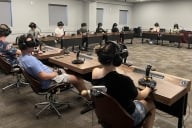You have /5 articles left.
Sign up for a free account or log in.
The massive open online course (MOOC) provider edX took a step toward boosting the credibility of its “graduates” on Thursday, announcing a partnership with Pearson’s testing centers that would allow students in edX’s free, online courses to take proctored exams.
Students who pass the proctored versions of the exams will still not receive credit from edX’s partner universities, which currently include the Massachusetts Institute of Technology, Harvard University, and the University of California at Berkeley. But the availability of supervised, in-person exams could make it difficult for other degree-granting institutions to deny course credit to students who pass them.
“There’s been a lot of talk about how the whole online methodology is not able to verify identification,” said Anant Agarwal, the president of edX, in a conference call with reporters on Thursday.
“This will take online learning to a next level,” he said.
The Cambridge, Massachusetts-based edX, which this year held its inaugural course, in electrical engineering, gave “certificates of mastery” to the 7,157 students who completed the coursework and passed the online final.
Now students who pass exams at a Pearson testing center will be given a certificate that notes that their final exam was proctored, according to Agarwal.
The nonprofit edX is the second MOOC provider to sign an agreement with Pearson over exam supervision. Udacity, a for-profit venture started by MOOC pioneer Sebastian Thrun, struck a similar deal with the company in June.
Pearson VUE, a subsidiary of the education and media conglomerate, which focuses on testing services, ran its first exams for Udacity’s introductory computer science course in August. “On the order of 20” students either have signed up to take the exam (for an $89 fee) or have already taken it — including the course’s instructor, University of Virginia computer science professor David Evans, who passed the exam at a Sunnydale, California testing center, according to Udacity officials.
Pearson expects to administer exams for selected edX courses, which were not named in the announcement, by December or January. (edX will develop the exams.) The emphasis on credentialing in MOOCs is proving to be a boon for Pearson, which is one of the few companies with a physical testing infrastructure that can match the scope and scale of massive, open education.
Site-based testing could persuade some institutions to accept MOOC credentials for credit toward a degree. Colorado State University’s Global Campus, the institution’s accredited online arm, said on Wednesday that it would grant three transfer credits to students who passed the Udacity computer science exam at a Pearson testing center.
The combination of in-person testing and a software platform that can chart the participation of a student over the course of a semester amounts to a “compelling case” for allowing students to redeem free MOOC learning for valuable college credits, said David Stavens, the chief operating officer at Udacity.
Coursera, another major MOOC provider, has not announced any partnership around site-based testing. But the company has been “looking into automatic plagiarism detection technology,” according to co-founder Andrew Ng. Reports of plagiarism in its first literature course last month prompted Coursera to make students reaffirm their commitment to an honor code each time they submit an assignment.
“We've been working on ways to prevent cheating and enhance the value of Coursera classes' certificates,” wrote Ng in an e-mail.
Honor codes, of course, are not necessarily a reliable deterrent to cheating. Harvard, one of edX’s founding institutions, is currently dealing with fallout from a cheating scandal on its physical campus, and is considering adopting an honor code to curb further breaches. Studies have shown that integrity pledges can mitigate cheating on some campuses, but researchers at Ohio University last year found that honor codes have less purchase with fully online students.
“The more distant students are, the more disconnected they feel, and the more likely it is that they’ll rationalize cheating,” said Frank M. LoSchiavo, one of the authors of the study, in an October interview.
For the latest technology news and opinion from Inside Higher Ed, follow @IHEtech on Twitter.








